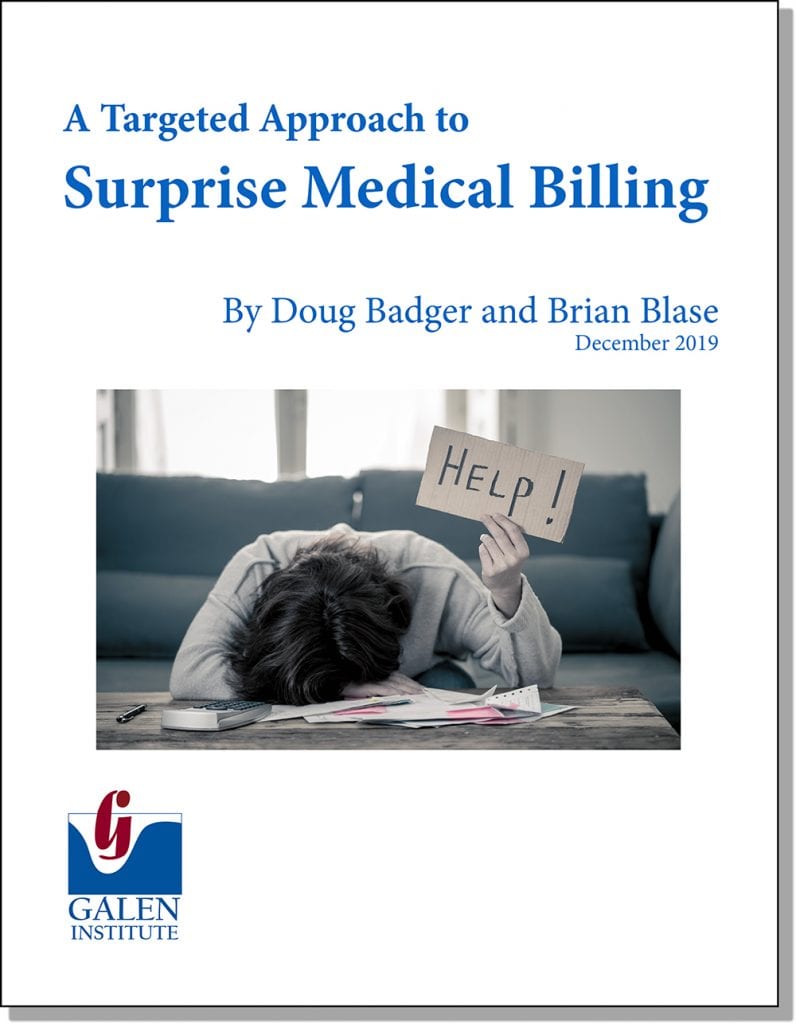If Medicare for All should ever become reality, America would face a far greater cost than the multi-trillion dollar price tag. This government controlled, single-payer health care system would come at the expense of Constitutional rights that are supposed to be preserved, protected, and defended. This should come as no surprise where health care is concerned.
The current multitude of health care rules and regulations have essentially buried the prohibition against federal interference in the practice of medicine (42 USC 1395). Therefore, it is no wonder that lawmakers are considering socialized medicine as a supposedly viable solution to our health care coverage challenges. However, in exchange for that universal coverage, with private health insurance practically eliminated, Medicare for All legislation overlooks the conscience rights of medical professionals in the effort to prohibit patient discrimination.
A New Paper By Doug Badger & Brian Blase |
Surprise medical bills are a source of frustration for many Americans, and legislation to address the problem appeared to be on a fast track early in the year. But action has since slowed, primarily due to a stand-off between the two powerful interest groups that often benefit from surprise medical bills: providers and insurers. Complicating this political calculus, Congress has its own interests in seeing this as a “pay for” to extend other unrelated health programs.
One plan Congress is considering would extend federal rate-setting schemes—a practice that is at the heart of proposals to move toward a single-payer system—to private physicians and health programs. Another would enact an arbitration model, which has a host of problems including imposing contractual terms on parties that have not entered into a contract.
If Congress makes rate-setting the solution to surprise bills, which consumers rightly resent, it may be difficult to explain why it shouldn’t adopt the same approach to medical bills that aren’t surprises, which consumers also often find unpleasant.
Congress should adopt a more thoughtful, targeted approach to the problem. This paper offers solutions to protect patients from surprise bills primarily by preventing insurers and providers from giving false and misleading information to consumers and by requiring that patients receive a good faith price estimate in advance of receiving scheduled care.
Truth-in-advertising protections combined with a good faith estimate requirement leaves one scenario in which patients need protection from surprise medical bills—emergency services at out-of-network facilities. Patients should be protected from balance billing in this situation, and Congress should apply existing federal regulations to determine the rate that insurers compensate providers in this narrowly-defined instance.
Many consumers want greater transparency in health care. Equipping them with timely and accurate information about medical prices would help reverse the sclerotic effect of price opacity. It would create room for price competition that could lead to the redesign of insurance products. And it would redirect the efforts of government, one of the leading causes of wasteful and inefficient medical spending, toward enabling a consumer-centered marketplace that curbs health care costs through choice and competition.
New York state is grappling with a Medicaid shortfall in the billions of dollars. And one of the main reasons is improper enrollment.
Using annual information from the Census Bureau to assess the demographic make-up of Medicaid enrollees over time, researcher Aaron Yelowitz and I estimated that 2.3 million to 3.3 million Medicaid enrollees nationally make an income in excess of what is allowed.
This is of increasing importance given that ObamaCare massively expanded what was historically a welfare program for vulnerable populations like the disabled and low-income children and pregnant women — and tens of billions of taxpayer dollars are at stake.

